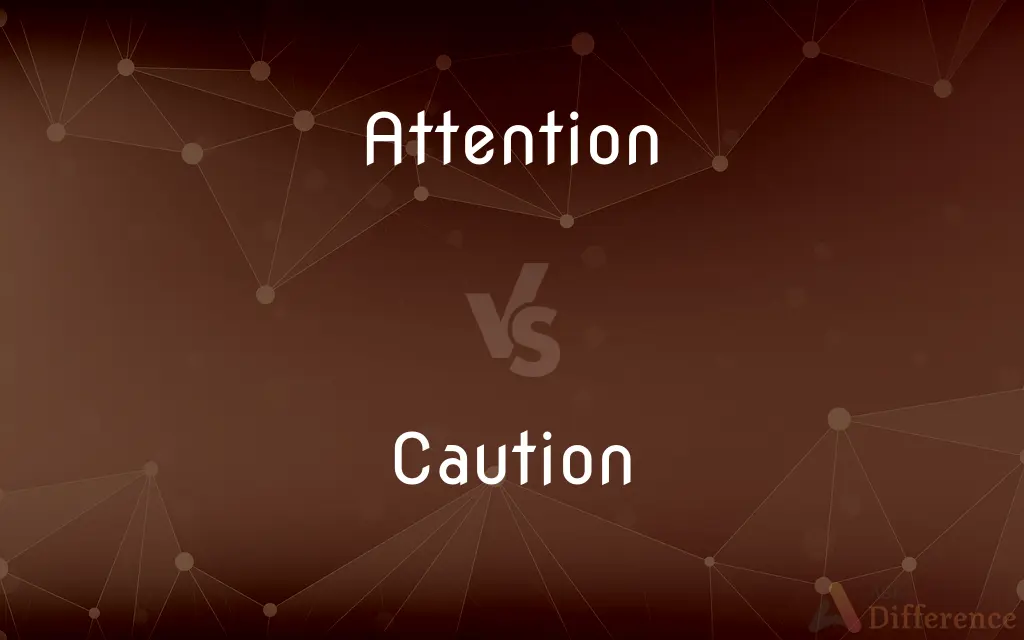Attention vs. Caution — What's the Difference?
By Maham Liaqat & Fiza Rafique — Updated on March 25, 2024
Attention involves focusing one's mental faculties on something, while caution denotes carefulness and the avoidance of risks or dangers.

Difference Between Attention and Caution
Table of Contents
ADVERTISEMENT
Key Differences
Attention is the cognitive process of selectively concentrating on one aspect of the environment while ignoring others. It is vital for learning, perception, and performing tasks, acting as a mental spotlight that highlights what is deemed important at any given moment. Caution, on the other hand, is a behavior or attitude that involves being vigilant and taking measures to avoid mistakes, risks, or dangers. It is characterized by prudence and careful thought before action, often in response to potential threats or uncertainties.
While attention primarily deals with the focus and direction of cognitive resources, caution is concerned with evaluating and managing potential risks and ensuring safety. Attention requires an active engagement with the task or object of focus, enabling an individual to process information more effectively. In contrast, caution involves a more deliberate and often slower process of decision-making, with an emphasis on avoiding negative outcomes or harm.
Attention can be divided into various types, including sustained, selective, and divided attention, each serving different functions in how we process information from our surroundings. Caution, however, manifests in behaviors and decision-making processes that prioritize safety and risk mitigation, such as when navigating dangerous environments or making critical decisions with significant consequences.
The capacity for attention is essential for cognitive development and learning, facilitating the acquisition of knowledge and skills through focused interaction with the world. Caution, while also important for safety and well-being, is rooted in the recognition of potential harm and the adoption of strategies to minimize risk. It plays a crucial role in survival by allowing individuals to anticipate and avoid hazards.
Despite their differences, both attention and caution are complementary aspects of human cognition and behavior. Effective attention can enhance one's ability to recognize potential dangers, thereby informing cautious behavior. Similarly, a cautious mindset may influence where and how one allocates attention, particularly in situations perceived as risky or requiring careful consideration. Together, they enable individuals to navigate their environments safely and efficiently, balancing the need for focus and information processing with the avoidance of harm.
ADVERTISEMENT
Comparison Chart
Definition
Focusing mental effort on specific stimuli
Prudence in avoiding risk
Key Focus
Cognitive processing
Risk avoidance
Functions
Learning, perception, task performance
Safety, risk mitigation
Types/Manifestations
Sustained, selective, divided attention
Careful decision-making, vigilant behavior
Outcome
Enhanced information processing
Reduced likelihood of mistakes or harm
Compare with Definitions
Attention
Concentrating on a particular object or activity.
Paying attention during lectures improves understanding.
Caution
Taking care to avoid risks or mistakes.
He approached the unfamiliar machine with caution.
Attention
Dividing mental effort among tasks.
Multitasking divides our attention, affecting performance.
Caution
Prioritizing safety in decision-making.
Caution advised them to save money for emergencies.
Attention
Mental focus directed at specific stimuli.
Her attention was fixed on the complex puzzle.
Caution
Avoiding hasty actions by considering possible outcomes.
Their caution in negotiations led to a favorable deal.
Attention
Selective awareness of the environment.
Driving requires constant attention to the road.
Caution
Prudent behavior in potentially dangerous situations.
She exercised caution when walking home late at night.
Attention
Sustained focus over time.
Completing the project demanded his sustained attention for weeks.
Caution
Vigilance against potential threats.
Travelers were warned to proceed with caution due to weather conditions.
Attention
Attention is the behavioral and cognitive process of selectively concentrating on a discrete aspect of information, whether considered subjective or objective, while ignoring other perceivable information. William James (1890) wrote that "Attention is the taking possession by the mind, in clear and vivid form, of one out of what seem several simultaneously possible objects or trains of thought.
Caution
Care taken to avoid danger or mistakes
Anyone receiving a suspect package should exercise extreme caution
Attention
Notice taken of someone or something; the regarding of someone or something as interesting or important
He drew attention to three spelling mistakes
Caution
An amusing or surprising person
‘You're a caution, you are,’ she said
Attention
The action of dealing with or taking special care of someone or something
He was found guilty of failing to give a patient adequate medical attention
Her business needed her attention
Caution
Say something as a warning
‘Be careful now,’ he cautioned
The Chancellor cautioned that economic uncertainties remained
Attention
A position assumed by a soldier, standing very straight with the feet together and the arms straight down the sides of the body
Saunders stood stolidly to attention
Caution
Careful forethought to avoid danger or harm.
Attention
The act of close or careful observing or listening
You'll learn more if you pay attention in class.
Caution
Close attention or vigilance to minimize risk
The car proceeded over the rickety bridge with caution.
Attention
The ability or power to keep the mind on something; the ability to concentrate
We turned our attention to the poem's last stanza.
Caution
Prudence or restraint in action or decision
Advised caution in choosing a school.
Attention
Notice or observation
The billboard caught our attention.
Caution
A warning or admonishment, especially to take heed
I received a caution from the doctor about fat in my diet.
Attention
The act of dealing with something or someone; treatment
This injury requires immediate medical attention.
Caution
A cautious action; a precaution
The climbers took the necessary cautions in preparing for the ascent.
Attention
Acts of interest or interference
"men who wanted ... freedom from censorship and the attentions of the police" (John Kenneth Galbraith).
Caution
(Informal) One that is striking or alarming.
Attention
A military posture, with the body erect, eyes to the front, arms at the sides, and heels together.
Caution
To warn or admonish
Cautioned him not to go swimming alone.
Cautioned that the findings were not conclusive.
Attention
Used as a command to assume an erect military posture.
Caution
To give a warning or admonishment
Cautioned against overeating.
Attention
(uncountable) Mental focus.
Please direct your attention to the following words.
Caution
Prudence when faced with, or when expecting to face, danger; care taken in order to avoid risk or harm.
Take caution
Have caution
Exercise great caution
Utmost caution is required when travelling in this dangerous neighbourhood
Act with caution
Attention
(countable) An action or remark expressing concern for or interest in someone or something, especially romantic interest.
Caution
A careful attention to the probable effects of an act, in order that failure or harm may be avoided.
The guideline expressed caution against excessive radiographic imaging.
Attention
A state of alertness in the standing position.
The company will now come to attention.
Caution
Security; guaranty; bail.
Attention
A technique in neural networks that mimics cognitive attention, enhancing the important parts of the input data while giving less priority to the rest.
Caution
(dated) One who draws attention or causes astonishment by their behaviour.
Oh, that boy, he's a caution! He does make me laugh.
Attention
(military) Used as a command to bring soldiers to the attention position.
Caution
(law) A formal warning given as an alternative to prosecution in minor cases.
Attention
A call for people to be quiet/stop doing what they are presently doing and pay heed to what they are to be told or shown.
Caution
(soccer) A yellow card.
Attention
The act or state of attending or heeding; the application of the mind to any object of sense, representation, or thought; notice; exclusive or special consideration; earnest consideration, thought, or regard; obedient or affectionate heed; the supposed power or faculty of attending.
They say the tongues of dying menEnforce attention like deep harmony.
Caution
(transitive) To warn; to alert, advise that caution is warranted.
Attention
An act of civility or courtesy; care for the comfort and pleasure of others; as, attentions paid to a stranger.
Caution
(soccer) To give a yellow card
Attention
The process whereby a person concentrates on some features of the environment to the (relative) exclusion of others
Caution
A careful attention to the probable effects of an act, in order that failure or harm may be avoided; prudence in regard to danger; provident care; wariness.
Attention
The work of caring for or attending to someone or something;
No medical care was required
The old car needed constant attention
Caution
Security; guaranty; bail.
The Parliament would yet give his majesty sufficient caution that the war should be prosecuted.
Attention
A general interest that leads people to want to know more;
She was the center of attention
Caution
Precept or warning against evil of any kind; exhortation to wariness; advice; injunction.
In way of caution I must tell you.
Attention
A courteous act indicating affection;
She tried to win his heart with her many attentions
Caution
A pledge, bond, or other security for the performance of an obligation either in or out of judicial proceedings; the promise or contract of one not for himself but another; security.
Attention
The faculty or power of mental concentration;
Keeping track of all the details requires your complete attention
Caution
To give notice of danger to; to warn; to exhort [one] to take heed.
You cautioned me against their charms.
Attention
A motionless erect stance with arms at the sides and feet together; assumed by military personnel during drill or review;
The troops stood at attention
Caution
The trait of being cautious; being attentive to possible danger;
A man of caution
Caution
A warning against certain acts;
A caveat against unfair practices
Caution
Judiciousness in avoiding harm or danger;
He exercised caution in opening the door
He handled the vase with care
Caution
The trait of being circumspect and prudent
Caution
Warn strongly; put on guard
Common Curiosities
What is the main difference between attention and caution?
Attention is about focusing mental efforts, while caution involves carefulness to avoid risks.
What are some examples of attention in everyday life?
Listening to a friend, studying for an exam, or driving are all activities that require attention.
How does caution benefit an individual?
Caution helps in avoiding potential dangers and making safer decisions.
How can someone improve their attention?
Practices like mindfulness, reducing distractions, and prioritizing tasks can enhance attention.
What role does caution play in decision-making?
It introduces a level of prudent scrutiny that can prevent hasty decisions and potential negative consequences.
How do attention and caution relate to risk management?
Together, they play a key role in identifying, assessing, and avoiding risks in various contexts.
Can attention and caution work together?
Yes, effective attention can lead to recognizing dangers, which in turn can inform cautious behavior.
Why is attention important?
It's crucial for learning, understanding, and interacting with the environment efficiently.
Is attention a skill that can be developed?
Yes, attentional skills can be improved through exercises and techniques designed to enhance focus and selective attention.
Can attention deficits affect cautious behavior?
Yes, attention deficits can impair the ability to recognize risks, potentially reducing cautious behavior.
Can being too cautious have negative effects?
Excessive caution may lead to missed opportunities or hinder spontaneity and exploration.
What are some examples of exercising caution?
Wearing a helmet while biking or reading contracts carefully before signing are acts of caution.
In what ways can technology impact attention and caution?
Technology can both aid and distract attention, while also providing tools and information that inform cautious behavior.
What is the importance of caution in unfamiliar situations?
Caution in unfamiliar situations can prevent accidents and mistakes by encouraging careful assessment and understanding.
How does the environment affect attention and caution?
A cluttered or hazardous environment may decrease attentional efficiency while increasing the need for caution.
Share Your Discovery

Previous Comparison
Ammeter vs. Galvanometer
Next Comparison
Stone vs. RockAuthor Spotlight
Written by
Maham LiaqatCo-written by
Fiza RafiqueFiza Rafique is a skilled content writer at AskDifference.com, where she meticulously refines and enhances written pieces. Drawing from her vast editorial expertise, Fiza ensures clarity, accuracy, and precision in every article. Passionate about language, she continually seeks to elevate the quality of content for readers worldwide.














































